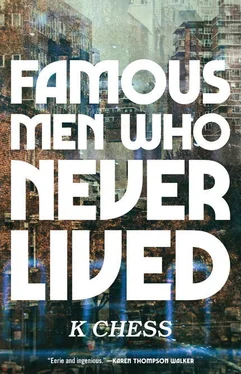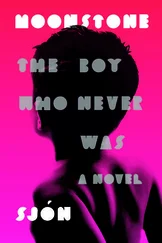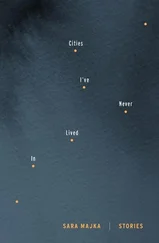The members of Vikram’s group sat in a semicircle, stone-faced. After nearly three years of enforced weekly meetings, it took a lot to provoke a reaction from them. Old Catalina, however, could always be relied on. “Do they really think we need to see this?” she asked Vikram in a highly audible whisper. She spat on the floor. “Reeducation horseshit.”
“Hey!” barked Emily Sato, their Reintegration Liaison Officer, from her seat by the door. “Mrs. Calderón, we’ve talked about this! That’s not sanitary.”
“Bah!” Catalina muttered. Vikram watched her smear the spittle across the floor with the tread of her walking sneaker as the video went on to show a group of modern jurors—a group as racially and ethnically diverse as the UDPs sitting in this high school basement tonight, though much more cheerful and enthusiastic—as they listened to the evidence in a case presided over by a wise-looking judge. Without Your Participation, No Justice Is Possible read the caption.
The DVD ended and Officer Sato flicked on the lights. “So, what did you think? Mrs. Yee? Mr. Westmorland? Anyone?”
Vikram looked around; each member of the group seemed immersed in a private stupor. Several people covertly checked their phones. Was anyone else thinking of the notorious Debrief abuses? About the way assaults against their people were never prosecuted as hate crimes? About the phony charities that had raised money in their name but never turned it over? No one responded to Sato’s question. “I thought this would be a good segue into a discussion of the type of justice system you guys had back at home!” she said. “Compare and contrast. Plus, good stuff to know if you ever get chosen for jury duty, right?”
“I don’t think any of us have to worry about that,” said a tall black man in the back whose name Vikram didn’t know. The guy was new—he’d arrived from his original resettlement destination in another state when the graphic design firm where he’d found work transferred him up to its New York office. His boss must have deemed him good at his job, valuable enough to go to the trouble to sponsor UDP Change of Residence paperwork. Resentfully, they’d all kept their distance from the newcomer so far.
“Great comment!” Sato said. “Want to elaborate, Mr. Agnew?” Vikram knew Sato was an intelligence officer of some kind—she wouldn’t tell them what agency—but she was certainly junior and low-ranking. Her questions had obvious right answers; any traps she set were easy to avoid. Still, seeing her take notes on her tablet, as she was doing now, always made Vikram nervous.
“I don’t think they ever call UDPs for jury duty,” Agnew said. “We’re not exactly the ‘peers’ of most of our fellow citizens. And even when it’s one of us that gets accused of the crime, it seems like they don’t trust the rest of us to be on the jury. There were no UDP jurors on the Micallef trial, right?” He looked around at the rest of them, shrugging. “Have any of you served on a jury up here? None of the UDPs I knew in Tampa ever got called.”
Catalina shifted in her seat. “Oh, shut up, you ass-whore,” she said, her words accented but perfectly intelligible to everyone in the room. She was from Colombia, first state among equals in the America Unida system. For the thirty years before the disaster, she’d led an ordinary immigrant life in their Brooklyn, but Vikram knew that before that, in her long-ago youth, she’d fought against the United States as one of a second generation of woman commandos in its on-again, off-again war against Capitalism. Once, Catalina had brought in her old uniform shirt to group and shown them the many medals pinned to it, explaining with pride what each one meant. A small condor emblem for her birthplace. A bee in memory of the fallen dictator, El Mero Mero. A purple hammer and sickle representing ideological purity. A double bar on a black chevron, awarded to Catalina for excellence in marksmanship.
“Mrs. Calderón!” Sato snapped. “That’s enough! You need to leave, now.”
This seemed to be what the old woman had been angling for all along. She stood slowly, shuffling away from the circle of folding chairs toward the corner, where her mobility scooter was parked. She showed a triumphant, broken-toothed grimace. “I’m just trying to help him.”
“How are you possibly helping?”
“I’m giving this little gootch some extra Reintegration Education.” Catalina pointed a shaking finger in Agnew’s direction. “Trying to show him what’s good for him. Why you didn’t learn to keep your trap shut in Tampa?” she scolded as she sank down into the scooter’s seat. “You can’t say stuff like that. You should know they put in your file. Never criticize them, dummy.”
“What about you?” Agnew asked. “You’re not exactly staying quiet.”
“Ha! I don’t gotta worry. I be dead soon. What they gonna do to me? But the rest of you. You wait. The government, they gonna put UDPs in camps.” She tilted her head back to look Sato in the eye. “Camps, just like your America done to the Japs. I read in my textbook. How you like that?”
“Christ, just get out,” Sato said. They could hear the whine of the motor fade as Catalina moved down the hallway to the elevator. “Can the rest of you just take out your Citizenship Workbooks?” Vikram checked the time and settled back into his seat to live out the rest of the session. Fifteen minutes left. Fifteen minutes.
Hel skulked around the edges of the reception room on the fourth floor of a SoHo hotel that should not even exist. This ought to be a park. She remembered it: Palast Park, with its fountain, its lion mural, its hobs for games of quoits. She stood where it ought to be impossible to stand, twelve meters above the surface of the earth, her own displaced self displacing nothing but air, floating in what ought to be empty space high above the benches and the tops of the elm trees and, a block away, on Broadway, the elevated tracks of the K train. But here, in this New York, there was no Palast Park. A blight had killed off most of the elms and relegated the survivors to cages. Even the trains, most of them designated with different letters and numbers, routed underground. It was all wrong.
And Oliveira was nowhere to be seen. Again, she checked the clock above the bar, where two white-jacketed servers mixed drinks for a throng of partygoers, the servers working together without speaking or even looking at each other. It was 20:15 already. He was not here.
How would she ever find the person he’d sent her to meet, the museum director? Hel considered asking the efficient young employee stationed at the door, but before she could decide whether this was reasonable, a fashionable stranger in a sequined jumpsuit and heels whirled away suddenly from the group she’d been part of. The contents of the woman’s cocktail splashed deliriously outward, soaking the top of Hel’s dress.
Hel shuddered from the cold impact and felt a flash of irrational fury, the way she felt when someone stepped on her shoe on the crowded subway platforms here. Ice cubes clattered against the polished floorboards.
“Oh my God!” the woman said, her cheeks flushed and eyes wild. Her male companion began to laugh at her. “You asshole! Why didn’t you tell me someone was standing right there!” The woman glared for a second, seeming to look straight through Hel, then turned abruptly and loped toward the bathroom without offering an apology.
The drink dripped between Hel’s breasts, cold and sticky. Her anger faded; she felt foolish instead. What was she even doing here?
“Hey.” A round brown-skinned woman with short-cropped hair now stood before her. “Hey, are you all right?” She held out a wad of cocktail napkins. “You want to take care of that yourself, or do you want some help?” She winked, and Hel noticed bitterly that she wore trendy sneakers and a flannel shirt, the sleeves rolled up to her elbows—unlike Hel and every other woman in the room, she was dressed for comfort.
Читать дальше












